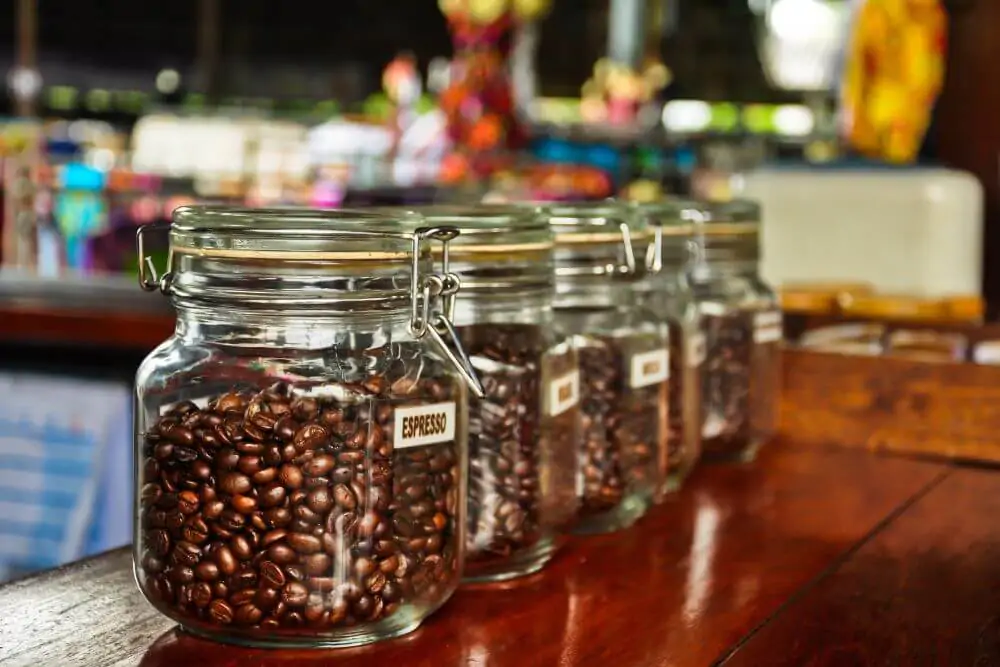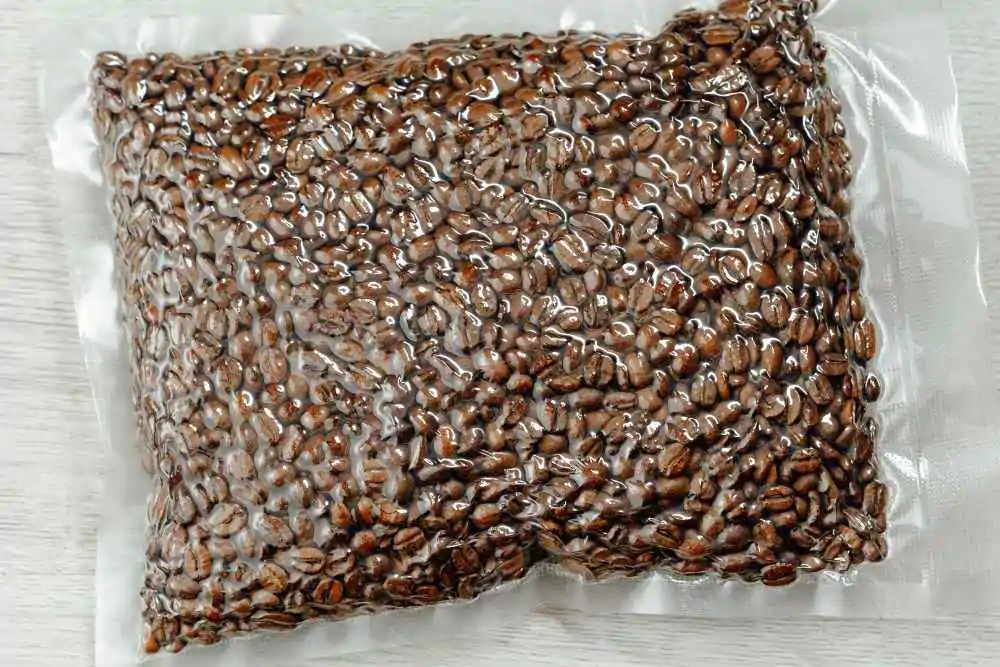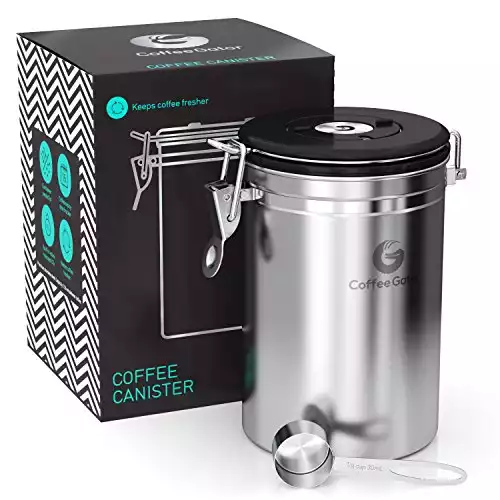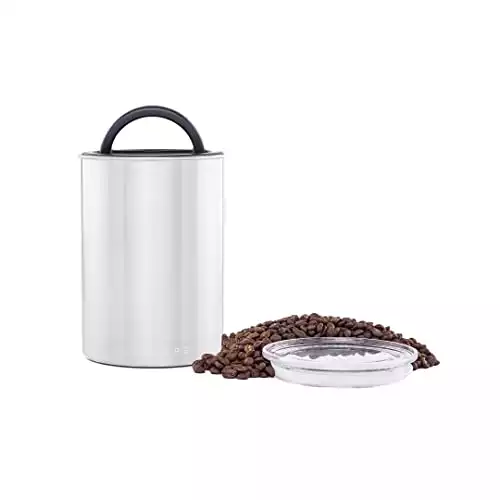This long term coffee storage article will help you keep your beans fresher for longer so you can avoid accidentally pouring yourself a cup of stale coffee.

We have all been there where you spend a fortune on a premium bag of coffee, only to accidentally leave it on a damp counter or in an area exposed to sunlight or direct heat. You don’t have to be a coffee lover to know that the best coffee is unspoiled, and the best way to stop your coffee from going off is by storing it correctly.
Coffee beans only last if stored properly. Otherwise, they lose their delicious taste and attractive aroma and eventually go rancid. Our long-term coffee storage guide can help keep your coffee from this fate.
To understand how best to store coffee beans, you must first comprehend what factors affect their freshness.
Factors that Affect Coffee’s Freshness
If you can avoid all the causes of beans going off, you can increase their brew-making lifespan.
Oxygen Exposure
Technically, air is the enemy of fresh coffee, causing it to lose its freshness from the moment the whole beans are roasted. That is because coffee contains natural oils, chemical compounds, and acids that oxidize when exposed to air.
After a while, oxidation can cause your coffee to lose its enticing aroma and eventually go rancid. Even if your coffee doesn’t go rancid, oxygen will eventually cause your ground coffee to lose its flavor and intensity.
Temperature Fluctuations
You should also consider temperature when choosing a place to store your coffee. A cool, dry location will work best. That is because warm environments can cause the molecules in the coffee beans to move more quickly and break apart, which results in less flavorsome coffee.
Moisture Content
Coffee beans absorb moisture, so storing them in a dry place makes sense. If you keep them in a damp location, your beans will immediately take on that moisture and lose their initial integrity. Moisture in the air can also have this effect, so fridges used for other foodstuffs may not make for good coffee storage areas.
You don’t want your next cup of coffee to taste like this morning’s bacon…or do you?
Light Exposure
Light affects the freshness of your coffee bean in a process called photodegradation. This is where the light breaks down the natural pigments and proteins within the coffee, changing its taste and aroma. You are left with a lifeless cup of joe that no coffee maker would be happy with.
That is why mason jars aren’t a good option for long term coffee storage.
Whole Bean or Pre-Ground Coffee
Coffee begins to lose its freshness immediately after roasting, so ideally, you will want to purchase your beans in small batches so you never need to store large amounts.
However, if that’s not possible, you should buy whole beans and grind them at home, as pre-ground beans are more exposed to the effects of oxidization and go off quickly.
The surface area of your coffee increases when you put it through the coffee grinder, which further exposes it to the effects of oxidization.
Long Term Coffee Storage Methods
Now you know what affects your coffee, let’s look at the best long term storage practice.
Choosing the Right Container
An exemplary storage option is a container specifically designed to be airtight. Such airtight containers can be expensive, but you can consider them an investment as they extend your coffee’s lifespan by protecting it from the elements.
A quality option on the market is Coffee Storage Gator
For larger amounts of coffee, Planetary Design Airscape
Vacuum Sealing

Vacuum-sealed bags can be a good option if you don’t want to invest in an airtight container. They will keep your coffee safe from oxidization and water content, and if stored in a dark place, they will also protect them from light.
However, these bags are often more fragile than the containers and less aesthetically pleasing. That being said, if you have nothing else at hand to store coffee long term, they can be a good option as they are still better than most retail packaging.
Freezing vs. Not Freezing
The jury is out on whether or not it is a good idea to freeze your coffee. On the one hand, dry freezing could lock in the flavor and aroma of your coffee to increase its lifespan.
However, some folks are apprehensive about freezing as they believe it could result in your coffee absorbing various smells in the vicinity at the time of freezing. There are also worries that your coffee can lose vitality due to freezer burn.
There is no comprehensive answer to whether or not this is a good idea, so it may be best to experiment and see whether or not it works for you.
How to Tell if Your Coffee Beans Have Gone Bad
Aroma
Fresh coffee beans have a rich smell that diminishes as the coffee goes bad and is replaced by a distinctly stale smell resembling burnt carbon. Therefore, if your coffee smells more like a recently burnt match than the fresh aroma of dark fruit and caramel, it’s past its best.
Taste
Tasting is the most obvious way to tell if your coffee has gone bad. Coffee that has gone bad has a bitter taste caused by increased quinic acid.
This type of acid increases the longer coffee is left, so if you get a sharp-tasting coffee that you immediately want to cover with sweetener or creamer, then it is likely that your coffee has gone off. Stale coffee also loses the flavor complexity that fresh coffee is known for, so if your coffee is bitter and flat, it’s probably not fresh.
Appearance
The physical appearance of your coffee is virtually the same if it’s stale or fresh. However, there can be a few indicators if it has gone bad in other ways. Check if your coffee beans are clumping together.
If they are, this can be a sign that the beans have been affected by moisture and, thus, spoiled.
Check The Roast Date
As obvious as it sounds, checking the roasting date of your coffee beans is a good indicator of whether they are still fresh. Beans can last up to 12 months when stored properly but tend to go bad within a couple of weeks when stored in their original packaging without any precautions.
Different Types Of Coffee For Long Term Storage
Ground Coffee Beans
Ground coffee beans are the most difficult type of coffee to store. That is because they have already been roasted, so their freshness constantly decreases. At the same time, the grinding process has increased their surface area, which has accelerated the process of oxidation.
To store ground coffee, you should have an airtight container.
Whole Roasted Coffee Beans
Whole beans last longer than ground coffee. However, there is a catch. Whole beans are roasted, and the heat from the roast triggers a chemical reaction that causes the oils inside the beans to start breaking down.
To get the full flavor of the roasted beans you bought, you must use them within a few months of purchase or store them properly.
Instant Coffee
Instant coffee is freeze-dried. This process removes the moisture from the coffee, which keeps it stable. Generally speaking, you don’t need to make any special storage arrangements to make instant coffee more durable. It is made to last a long time.
However, instant coffee can absorb moisture from the air, so if you live in an especially hot and humid place, it can get wet and go bad quickly. The best workaround for this problem is repackaging it in an airtight container.
Green Coffee Beans

The natural oils in green coffee beans are more stable because the beans are not roasted. If you decide to store them, you should do so in a food storage container free of oxygen and keep them away from heat and light. When stored in this way, these beans can last several years.
The Key To Long Term Coffee Storage
The key to long term coffee storage is recognizing that the lifespan of your beans will increase if they’re stored in an airtight container and kept in a cool, dry place. If you are investing in top-notch coffee, then it’s likely that this container will prove to be an investment in the long run.
You should also be able to admit defeat; if your coffee has gone bad, you are much better off binning it than risking making a rancid cup of joe. Coffee is a wonderful drink and should be enjoyed as it was always supposed to be; fresh, aromatic, and tasty.
FAQ
How long will coffee last in Mylar bags?
According to several survival websites, an unopened bag of unroasted whole-bean coffee can last several years in Mylar bags if not exposed to natural aggressors such as light, oxygen, and moisture. Mylar is a metallic-looking material that is impervious to gases. The lifespan of the coffee can be increased even further if you add an oxygen absorber into the bag and seal it.
How long does coffee last in the freezer?
The National Coffee Association states that you can freeze whole coffee beans for up to a month. There are mixed reports of whether or not this is a good idea, as some believe freezing the coffee compromises its quality.



